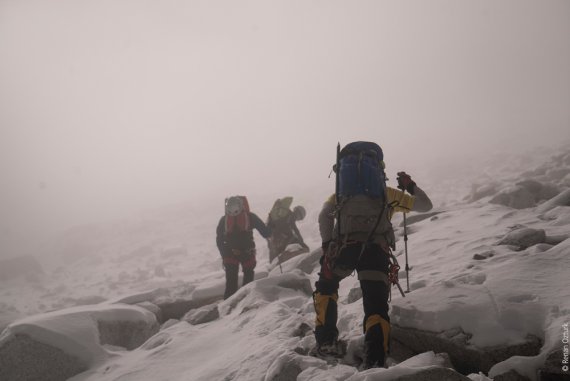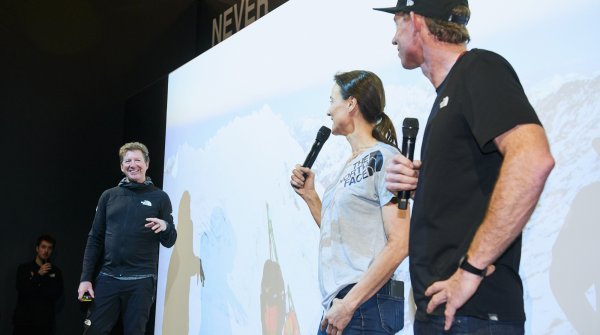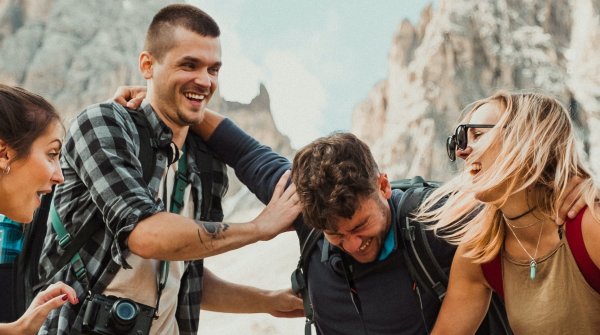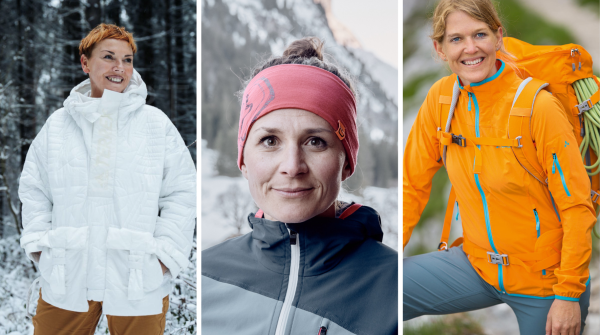
The roughly 6000 meter-tall Hkakabo Razi has only been scaled a single time. A group sponsored by The North Face and National Geographic set out for a second ascent in late 2014. But the expedition came to a crashing end at 5500 meters. The team had a falling out, and the leader stayed behind.
Participant and journalist Mark Jenkins from the USA explains in an interview with ISPO.com what happened during the expedition that lead to the film “.”
Interview with Mark Jenkins:
ISPO.com: Mr. Jenkins, how did this trip from hell to the Hkakabo Razi come to be? The journey alone lasted a month, including a 200-kilometer march through the jungle...
Mark Jenkins: And that was still one of the fun phases! These baby Hell’s Angels who chauffeured our hoards of luggage through the mud on their crummy little 100 cubic meter-mopeds: glorious! But the complete story is actually this: this is how you don’t do an expedition!
You already have so many under your belt.
That's right, my first was to Tibet, 1984. I got used to being in remote places. On that subject: There aren’t many of them anymore, they’ve almost disappeared off the planet. Everest? Ha! The North Pole? You can land a plane there and have dinner. The same at the South Pole. I once told a story about the most remote place in the USA – with the exception of Alaska: it was at my home in Wyoming, not 23 miles away from the nearest road.
You have to walk to the really outlying places – and for a pretty long time. Exploration is as good as finished – all the way to the bottom of the sea. Those who really want to still discover something have to become astronauts. What’s left: adventure. Many cliffs still haven’t been scaled, many rivers still haven’t been traveled, many summits still haven’t been conquered.
Read here: Himalayan Mystery Lunag Ri: Climbing Ace David Lama Makes Another Go >>>

“Irritated by commercialization”
In the film, one of your teammates asks, “Why are you so driven, so obsessed? Where is this coming from with you?”
So, let’s say: I only turn around when nothing else will work. Over the years, many of my best friends have died on expeditions, two of which I once wanted to go to the Hkakabo Razi with, in 1993. We failed superbly, and then were arrested by the military junta in Burma, but it was an adventure.
I carried a photo of our ‘93 tour in my breast pocket the entire time during our present expedition, and wanted to leave it at the summit as a sort of memorial. I had a stronger connection with this mountain than my teammates, it was already my fifth time in Burma. But I only told my colleagues all of that at the end.
Who put together the team?
I had been on Everest with the expedition leader Hillaree O’Neill, and we were both totally irritated by the commercialization that’s being operated there. It has nothing to do with alpine climbing. All of the ropes are already there, Sherpas haul everything for you. It isn’t a true goal for a real mountain climber anymore. There are more exciting things in the Alps.
We wanted to go to a more remote site: the Hkakabo Razi. We had gotten The North Face and National Geographic as sponsors for the roughly 100,000 dollar trip. I was the only one of the six of us who wasn’t a North Face athlete. Although the trip was my idea, we were practically a North Face team – with one woman as the leader.
US sports climbing champion “wails”
In the high camp at 5500 meters, in the center of the storm and at icy temperatures, an argument broke out when the group separated: the leader stayed behind with the youngest, while the men tackled the summit. Hillaree said to you, “Fuck you, Mark, for your lack of trust!” What was the mood like when, after the failed summit attempt, you came back to Hillaree and Emily at the basecamp?
Emily was delighted that she was back down, but Hillaree was pissed off at me. And then we had to go back through the jungle together for weeks. She was a good leader – up to the point when we went high up in the mountains where more technical skills, knowledge, and experience are required. She’s actually a big mountain skier. And Emily Harrington, the youngest, is the US champion in sports climbing. All of that has little to do with alpine climbing. But they’re all part of this new type of athletes: they’re really good at social media and PR.
Something that still doesn’t help much at 5500 meters...
Correct. Emily was totally scared, she was wailing the entire time.
Sounds dangerous.
It was, too. But we’re all still on friendly terms. I fought with Hillaree often and hard, but we talked it out. We won’t be going on any more expeditions together. But it was also my mistake: I overestimated our team and underestimated the technical difficulties on the mountain.
When we stood underneath the northern wall, I just thought, ‘Oh man! This isn’t going to be a march to the summit, it’s going to be the most technically demanding sort of climbing.’ The mountain has only been scaled once, in 1996 by a Japanese man. But it also took him three expeditions. Our actual problem was time.
What do you mean by that?
When we finally arrived at basecamp after a month, I suggested pushing the return flight back by two or three weeks – but nobody wanted that. Everyone had their appointment calendar on their minds. Thus, we had only nine days from basecamp up to the summit and back.
It took the Japanese man 25 days back then, and he was an experienced alpinist, a proper climber. We overestimated ourselves. I learned several lessons that I thought I had already learned. But the mountains always continue to teach you about what you’re made of.
The American Mark Jenkins (58) is a journalist for National Geographic, and reported on the wars in Afghanistan and in the Congo. He undertook more than 75 expeditions to the most remote places on Earth, most of them climbing.
"Down to Nothing" on Video:

 OutDoor by ISPOOutDoor in transition
OutDoor by ISPOOutDoor in transition
- Awards
- Mountain sports
- Bike
- Fitness
- Health
- ISPO Munich
- Running
- Brands
- Sustainability
- Olympia
- OutDoor
- Promotion
- Sports Business
- Textrends
- Triathlon
- Water sports
- Winter sports
- eSports
- SportsTech
- OutDoor by ISPO
- Heroes
- Transformation
- Sport Fashion
- Urban Culture
- Challenges of a CEO
- Trade fairs
- Sports
- Find the Balance
- Product reviews
- Newsletter Exclusive Area
- Magazine




